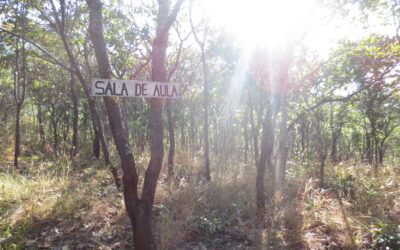The resident undergraduates have left Cambridge for the spring holidays, but the university’s zoology department burst into life again as hundreds of young conservation scientists from across the world packed the lecture hall for the 19th Student Conference on Conservation Science (SCCS).
This highly popular annual event, co-organised by the TBA and held at the end of March, brought together 200 delegates from 54 countries for three days of student talks, practical workshops, an exhibition of posters, plenary talks, and networking.
Amongst the delegates this year were several TBA alumni, including Kenyan Cyrus Kavwele, who is currently finalising his masters while working as a graduate research fellow at Karatina University. The SCCS provides an ideal forum for early career conservationists to share the findings of recent research.
Surrounded by the hubbub of exchange and discussion, Cyrus was kept busy during breaks discussing a poster highlighting his work on the impact of bush encroachment on wildlife species diversity, composition and habitat preference.
For Cyrus, the benefits of attending the conference have been extended because he won a Miriam Rothschild internship – available to SCCS delegates from developing countries and Eastern Europe – to pursue a project of mutual interest with a UK-based NGO or university department.
So, having packed up his poster at the end of the SCCS, Cyrus set off for South Wales where he is now spending a month at Swansea University to develop his PhD proposal with the help of Professor Luca Borger.
The focus of his PhD interest is Kenya’s small carnivores, a richly diverse group but one which has been largely overlooked as research has concentrated on large predators. Small carnivores play an important role in keeping the population of small mammals in check, with a range of knock-on effects, for example in disease transmission. Cyrus is determined to build much needed information, particularly the ecology of small carnivores and how climate change will affect this and their movement.
Cyrus says that his experience on the TBA field course in Kirindy in 2015 has been a tremendous boost to his career in conservation:
“TBA was a game changer for me.”
“I continue to apply what I learnt, for example, how to minimise bias in study design, and how to collect data. When you read about these things or learn about them theoretically, it is simply not helpful. But on the TBA course, it is on the ground and hands-on. You do things yourself and so you can understand.”
Other TBA alumni at this year’s SCCS showcased the variety of conservation issues that alumni are working in: Student talks were given by Solohery Rasamison on bird monitoring, and by Marta Sampaio on amphibian conservation in Mauritius; alongside Cyrus, there were posters by Kijenje Magessa on the effectiveness of Participatory Forest Management in Tanzania, and by Lovanomenjanahary Marline on Malagasy bryophyte distribution.



